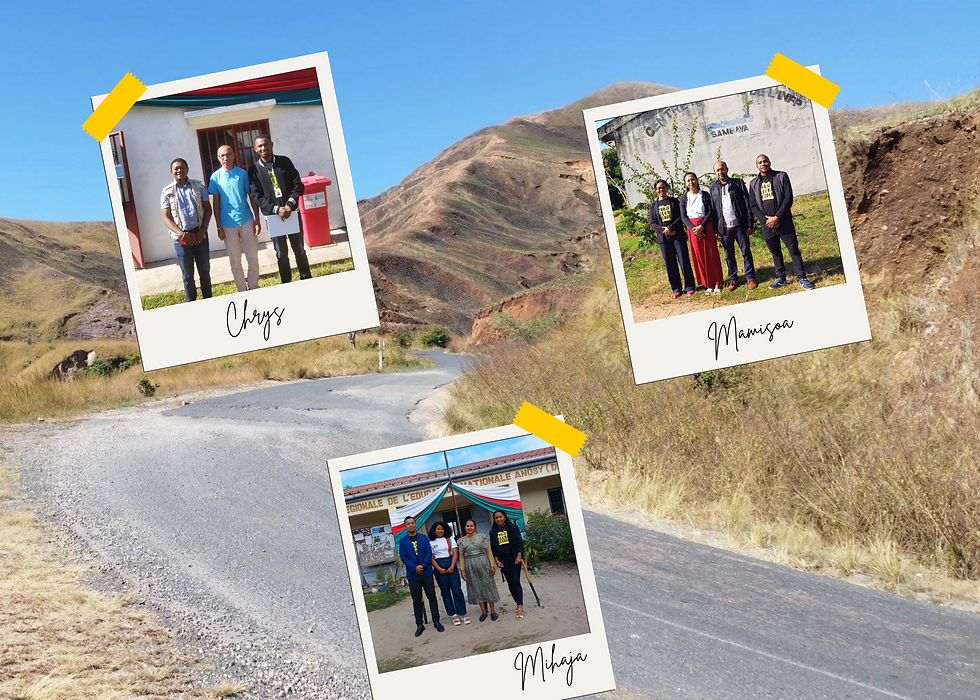“My Life Would Not Be the Same”: Findings from a Qualitative Retrospective Study of our Program
- Maia Ramarosandratana

- 12 mars 2023
- 2 min de lecture

Projet Jeune Leader (PJL) strives to deliver a comprehensive sexuality education program that creates positive, meaningful, and sustained changes in young adolescents’ lives.

For the first time, we conducted a qualitative retrospective study of our program—grounded in the voices of past participants—which elucidated longer-term, nuanced outcomes among the adolescents we serve.
All of our past program evaluations—as well as most research on adolescent sexual and reproductive health programs in low-income countries—have focused on impact during implementation (in other words, when the adolescent was an active participant) or immediately after.
By talking with young people a few years after they finished our program, we were able to better understand the mid-term outcomes of our comprehensive sexuality education program.
Our Study Participants and Methods
Given the study’s retrospective nature, we sought out young adults who had participated in our program at least two years ago. They had all studied in one of the six middle schools in Fianarantsoa where we had worked at the time. We recruited participants through Facebook groups frequented by a large number of youth in the city (this was in the midst of the COVID-19 pandemic in Madagascar, so publicity through physical spaces wasn’t possible).
Ultimately, 34 young adults participated in the study: 18 males and 16 females, with an average age of 19.8 years old. 91% of them had participated in PJL’s program three years ago; the others, two years ago.
Members of PJL’s Monitoring and Evaluation team conducted semi-structured interviews (in Malagasy) with each study participant, following an interview guide containing 13 open-ended questions and optional probing questions for each. The interviews were transcribed (removing identifying information) to maintain the accuracy of participants’ words, expressions, and dialect. We then analyzed the data using Grounded Theory to draw out key themes.
What We Wanted to Know
We had two main areas of inquiry: we wanted to explore participants’ experiences with the program, and we wanted to understand how former participants assessed the impact of the program on their lives, a few years out.

Our Key Findings
What We Learned about the Relevance of our Program
Our program felt relevant to participants at the time because they participated at the right time: just before or as they were hitting puberty.
Interviewees shared that our program complemented other sources of information about sexual and reproductive health that participants were receiving elsewhere—and covered this information in more depth and with more clarity.
Participants were able to build sustained relationships with PJL’s Educators, a foundation to discussing more sensitive or nuanced topics.

What We Learned about Participants’ Experience of our Program
The majority of interviewees had positive experiences with the program, largely through their interactions with PJL Educators.
The former participants described PJL’s Educators as "cool," "smiling," "nice," "funny," and noted their young age as an important attribute. This helped make PJL Educators feel accessible.
Participants appreciated the Educators’ participatory and creative teaching approaches.
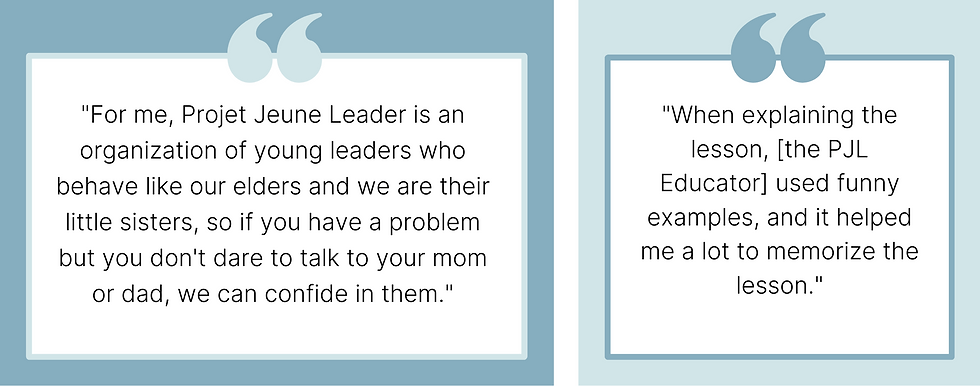
How our Program Influenced Safer Sexual Behaviors
Some past participants shared that they had decided to delay having sex for the first time as a result of the information they received from the PJL Educators about body development and relationships, and skills they received about decision making. However, some former participants shared that they had difficulty convincing their partners to delay sexual intercourse, especially partners who had not gone through the PJL program.
PJL Educators’ messages about the dangers of early pregnancy and sexually transmitted infections encouraged participants to adopt safer sexual behaviors, including condom use and fidelity to a sexual partner.
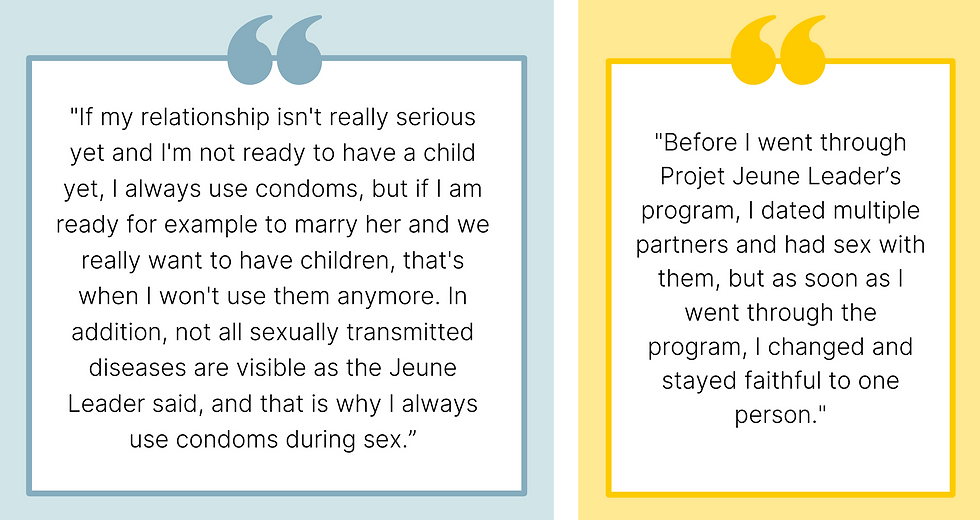
How our Program Influenced Alcohol and Drug Use
Several interviewees explained that PJL made them aware of the dangers of alcohol and drugs and consequently did not use them, even when surrounded by peers encouraging them the opposite.
Some of the former participants also spread the messages they acquired on this subject to their peers, showing the spillover effects of our program.
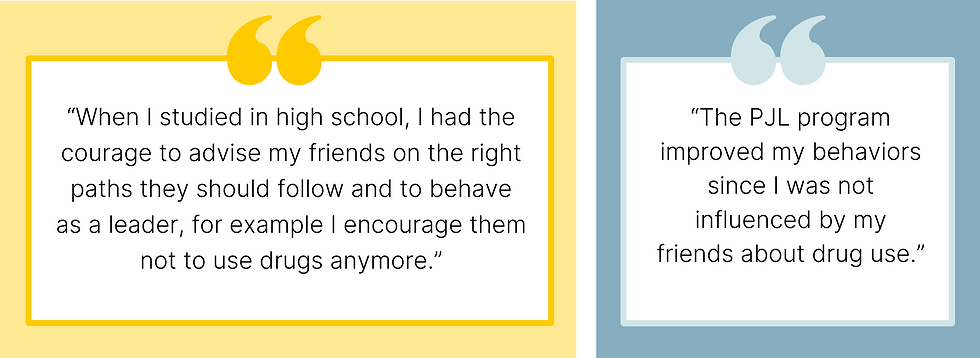
How our Program Influenced Staying in School
Interviewees shared that they decided to continue their studies because of the support they received from the PJL Educators during difficult times.
Former participants also explained that the sports and recreational activities and the participatory classes conducted by the PJL Educators created a more attractive and motivating school environment.
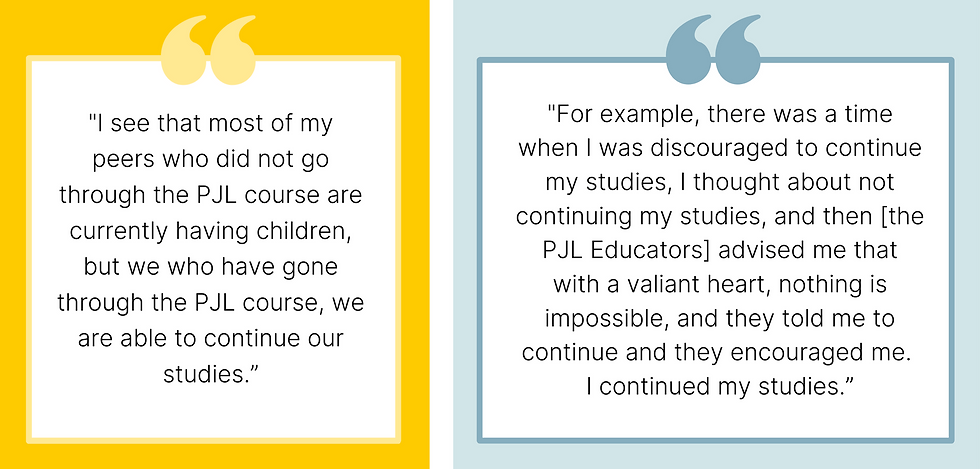
What We Learned about our Impact on Social-Emotional Skills
Many former participants repeatedly cited self-esteem as a skill that they learned through PJL’s program.
Interviewees also mentioned other social-emotional skills, such as group work, good listening, decision making, assertive communication, and leadership.

Our Main Takeaways
This qualitative retrospective study helped us understand and document the mid-term outcomes of our program on former participants.
Participants explained that the PJL program influenced them to engage in safer sexual behaviors throughout adolescence. They also shared that they gained social-emotional skills through the PJL program that helped them make responsible and healthy decisions as adults. These findings were perhaps not unexpected but validating and exciting nonetheless—these are primary intended outcomes of comprehensive sexuality education. These findings showed us that our program works as we hoped in key ways.

Results from this study also corroborated that our program has had a positive impact on participants’ education, such as motivation to stay in school and improved perceptions of the value of education—multidimensional outcomes beyond the realm of health.
These impacts reinforce the importance of comprehensive sexuality education—not just for young adolescents in the immediate-term, but also for the positive development of an entire generation of Malagasy youth.
--> Looking for more details about our study? Read the findings brief.
We would like to thank the Principality of Monaco – Department of International Cooperation and the Segal Family Foundation for supporting this study.



